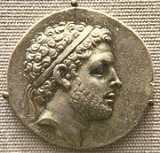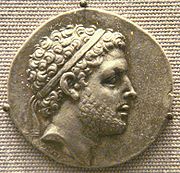
Perseus of Macedon
Encyclopedia


Greek language
Greek is an independent branch of the Indo-European family of languages. Native to the southern Balkans, it has the longest documented history of any Indo-European language, spanning 34 centuries of written records. Its writing system has been the Greek alphabet for the majority of its history;...
: Περσεύς) (ca. 212 BC
212 BC
Year 212 BC was a year of the pre-Julian Roman calendar. At the time it was known as the Year of the Consulship of Flaccus and Pulcher...
- 166 BC
166 BC
Year 166 BC was a year of the pre-Julian Roman calendar. At the time it was known as the Year of the Consulship of Marcellus and Galus...
) was the last king (Basileus
Basileus
Basileus is a Greek term and title that has signified various types of monarchs in history. It is perhaps best known in English as a title used by the Byzantine Emperors, but also has a longer history of use for persons of authority and sovereigns in ancient Greece, as well as for the kings of...
) of the Antigonid dynasty
Antigonid dynasty
The Antigonid dynasty was a dynasty of Hellenistic kings descended from Alexander the Great's general Antigonus I Monophthalmus .-History:...
, who ruled the successor state in Macedon
Macedon
Macedonia or Macedon was an ancient kingdom, centered in the northeastern part of the Greek peninsula, bordered by Epirus to the west, Paeonia to the north, the region of Thrace to the east and Thessaly to the south....
created upon the death of Alexander the Great. He also has the distinction of being the last of the line, after losing the Battle of Pydna
Battle of Pydna
The Battle of Pydna in 168 BC between Rome and the Macedonian Antigonid dynasty saw the further ascendancy of Rome in the Hellenic/Hellenistic world and the end of the Antigonid line of kings, whose power traced back to Alexander the Great.Paul K...
on 22 June 168 BC; subsequently Macedon came under Roman
Ancient Rome
Ancient Rome was a thriving civilization that grew on the Italian Peninsula as early as the 8th century BC. Located along the Mediterranean Sea and centered on the city of Rome, it expanded to one of the largest empires in the ancient world....
rule.
Reign
In 179 BC Philip V of MacedonPhilip V of Macedon
Philip V was King of Macedon from 221 BC to 179 BC. Philip's reign was principally marked by an unsuccessful struggle with the emerging power of Rome. Philip was attractive and charismatic as a young man...
died. In the previous year Philip had his pro-Roman son Demetrius
Demetrius (son of Philip V)
Demetrius was the younger son of Philip V of Macedon, but his only son by his legitimate wife, the elder brother Perseus being the son of a concubine....
executed. Perseus had been jealous of Demetrius' success as ambassador to Rome
Rome
Rome is the capital of Italy and the country's largest and most populated city and comune, with over 2.7 million residents in . The city is located in the central-western portion of the Italian Peninsula, on the Tiber River within the Lazio region of Italy.Rome's history spans two and a half...
and had convinced their father to have him poisoned as a potential usurper. The Romans favored Demetrius, and Perseus' role in killing Demetrius did not endear him to Rome when he took the throne.
One of his first acts on becoming king was to renew the treaty with Rome. Yet, Perseus' other actions troubled Rome. His interference in the affairs of his neighbors, his ousting of Roman ally Abrupolis
Abrupolis
Abrupolis was a king of the Thracian Sapaei, and ally of the Romans. He attacked the dominions of Perseus of Macedon, eldest son of the recently deceased Philip V of Macedon, around 179 BC, and laid them waste as far as Amphipolis, as well as overrunning the gold mines of Mount Pangaeus...
from his territories, his armed visit to Delphi
Delphi
Delphi is both an archaeological site and a modern town in Greece on the south-western spur of Mount Parnassus in the valley of Phocis.In Greek mythology, Delphi was the site of the Delphic oracle, the most important oracle in the classical Greek world, and a major site for the worship of the god...
, his avoidance of the Roman ambassadors to Macedonia, and his dynastic marriages all gave Rome cause for concern. Soon Rome and Perseus went to war in the Third Macedonian War
Third Macedonian War
The Third Macedonian War was a war fought between Rome and King Perseus of Macedon. In 179 BC King Philip V of Macedon died and his talented and ambitious son, Perseus, took his throne. Perseus married Laodike, daughter of King Seleucus IV Keraunos of Asia, and increased the size of his army...
(171-168 BC). Although Perseus had some initial success, the war ended with the King's surrender to the Roman general Lucius Aemilius Paullus after his decisive defeat at the Battle of Pydna
Battle of Pydna
The Battle of Pydna in 168 BC between Rome and the Macedonian Antigonid dynasty saw the further ascendancy of Rome in the Hellenic/Hellenistic world and the end of the Antigonid line of kings, whose power traced back to Alexander the Great.Paul K...
, and his eventual imprisonment in Rome with his half-brother Philippus and son Alexander. Blaise Pascal mentions in his Pensées (Lafuma 15) that Perseus was blamed for not committing suicide, supposedly after his defeat at Pydna. The Antigonid kingdom was dissolved, and replaced with four republics. Andriscus of Macedon broke off the Roman rule for about a year, but was defeated in 148 BC by the Romans. In 146 BC, the four republics were dissolved, and Macedon officially became the Roman province of Macedonia.
On 178 BC
178 BC
Year 178 BC was a year of the pre-Julian Roman calendar. At the time it was known as the Year of the Consulship of Brutus and Vulso...
he had married Laodice V
Laodice V
Laodice V was a Greek Princess of the Seleucid Empire. Through marriage she was a Queen of the ruling Antigonid dynasty in Macedonia and possibly later of the Seleucid dynasty.-Family and Early Life:...
, the daughter of Seleucus IV
Seleucus IV Philopator
Seleucus IV Philopator , ruler of the Hellenistic Seleucid Empire, reigned from 187 BC to 175 BC over a realm consisting of Syria , Mesopotamia, Babylonia and Nearer Iran . He was the second son and successor of Antiochus III the Great and Laodice III...
from Syria
History of Syria
The history of Syria:*Prehistory and Ancient Near East: see Pre-history of the Southern Levant, Fertile Crescent, Ebla, Mitanni*Antiquity: see Syro-Hittite states, Greater Syria, Roman Syria...
. One son of Perseus and Laodice, Alexander was still a child when Perseus was conquered by the Romans, and after the triumph
Roman triumph
The Roman triumph was a civil ceremony and religious rite of ancient Rome, held to publicly celebrate and sanctify the military achievement of an army commander who had won great military successes, or originally and traditionally, one who had successfully completed a foreign war. In Republican...
of Aemilius Paullus in 167 BC
167 BC
Year 167 BC was a year of the pre-Julian Roman calendar. At the time it was known as the Year of the Consulship of Paetus and Pennus...
, was kept in custody at Alba Fucens
Alba Fucens
Alba Fucens was an ancient Italic town occupying a lofty situation at the foot of the Monte Velino, c. 6.5 km north of Avezzano, Abruzzo, central Italy. Its remains are today in the comune of Massa d'Albe....
, together with his father. He became a skillful toreutes, learned the Latin
Latin
Latin is an Italic language originally spoken in Latium and Ancient Rome. It, along with most European languages, is a descendant of the ancient Proto-Indo-European language. Although it is considered a dead language, a number of scholars and members of the Christian clergy speak it fluently, and...
language, and became a public notary.

